by Helen Nichols: Green tea is a delicious variety of tea that is made from the Camellia sinensis plant…
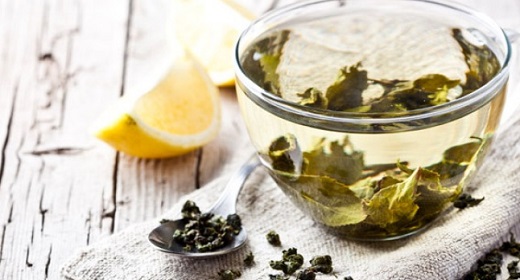
This type of tea is available in literally thousands of varieties.
From strong to mild and flowery, you’ll always find something you like in the green tea family.
Green tea gets its whimsical color because it is not fermented like other teas.
This beverage has been enjoyed for centuries.
Enjoyed hot or cold, or even in powdered form, green tea is considered a superfood and hailed for its strong antioxidants and health benefits.
We are looking at some amazing health benefits of green tea.
History
Much like coffee, people first began using tea as something to chew on instead of something to drink.
In the eighth century, steaming leaves became popular for oxidation inhibition.
By the twelfth century, this process became known as a frying method, which involved heating the tea immediately after picking and then cooling it down immediately.
This created an unoxidized taste and famous green appearance.
Tea became a fundamental part of Chinese society during the Tang Dynasty in the seventh century.
By this time, tea was no longer considered just for high-class society but viewed as a common drink for all people.
During the thirteenth century, China’s version of “high tea” became a form of government taxation and was an important part of royal culture.
This control and taxation were done away with in the fourteenth century Ming Dynasty.
During the Ming Dynasty, roasting green tea became popular and still is today.
It is said that green tea has been consumed for some 5,000 years in China.
By the sixteenth century, Western traders began taking tea back to Europe, and its popularity exploded.
In 1767, Great Britain created a “Tea Tax” once they saw how popular their favorite drink was becoming in America.
Americans retaliated in outrage by dumping forty-five tons of green tea into the harbor during the Boston Tea Party in 1773.

How Green Tea Grows
Green tea can be grown at home, in forests, or on tea plantations.
Green tea is grown from the Camellia sinensis strain and needs a very warm climate to grow properly.
Green tea responds well to filtered sun but not direct sunlight.
Green tea plants need excellent drainage to grow lush.
At tea plantations, tea plants start out as soft seedlings and are usually grown a nursery for months before being brought out into open fields.
Being kept in a nursey will ensure the tea is protected from harsh elements.
Tea leaves are taken when they first bloom and then steamed at 200° Celsius.
After this process, tea leaves will then be rolled and packaged, which is what turns tea into green tea.
Heating the leaves quickly gives green tea such high levels of antioxidants compared with other teas.

Varieties
Green tea comes in thousands of varieties, all with their own subtle differences.
- Hojicha is a strain of green tea that is made by roasting it at 200° Celsius and then chilled. The light taste and pleasant aroma of this tea are mild enough for children to enjoy.
- Sencha is a loose term that refers to a type of green tea that is meant to be infused. To get the rich flavor, cultivators will use only the top leaves. The taste of this tea is said to be flowery with a freshness that can cleanse your palate.
- Kabusecha is a shade-grown tea, which means that the leaves are meticulously cared for in a shaded environment to give them a unique taste. This flavor is intense, rich, and fresh. Expect a balance of sweet and earthy in this well-blended green tea.
- Gyokuro is often viewed as the best green tea. The leaves of this tea are pointed and have a fragrant, smooth finish on the tongue. Before harvesting, these tea leaves are brought out of direct sunlight by placing a reed screen over them for twenty days. This green tea is compared with seaweed in aroma and has a smooth, classic green tea flavor.
- Genmaicha is an interesting 50/50 blend of green tea and rice. These grains and leaves are mixed together and steamed for a low-caffeine drink.
- Matcha is a common green tea that is over a hundred years old. This powdered version of green tea is commonly used in traditional Japanese tea ceremonies. Matcha tea is commonly used in Japanese cooking and baking.
- Shincha is often the first tea of the season to be picked. This green tea is refreshing and full bodied in flavor and contains low amounts of caffeine.
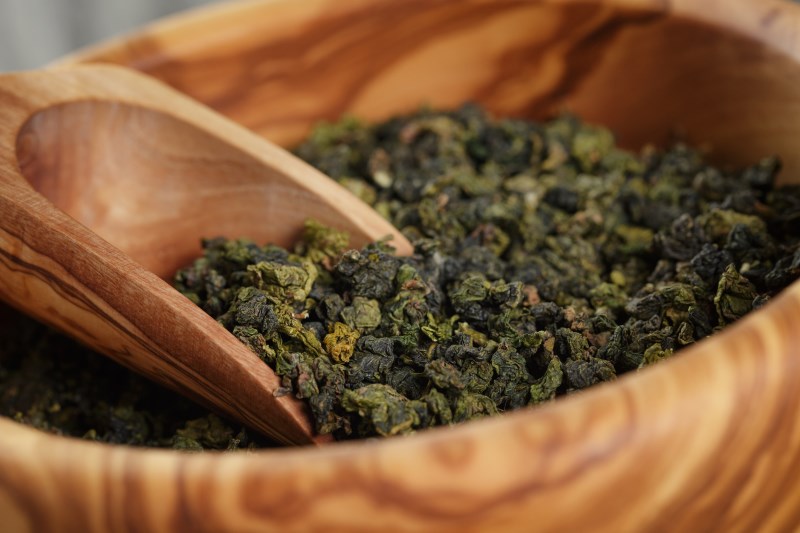
Interesting Facts
Green tea is a fascinating leaf, with centuries of history behind it.
- China is considered to be the birthplace of tea. It is said that in 2737 BC the second emperor of China, Shen Nung, had tea leaves blown into his pot of boiling water by accident and found the aroma flavorful and intoxicating.
- A variation of common green tea is called Sencha. These leaves are picked from the middle of the branch and are older and larger than average leaves.
- Second only to water, green tea is the most consumed drink on a global scale.
- Green tea is best when consumed between meals. Since green tea has the potential to absorb iron, drinking it between meals instead of with them will ensure it’s not sucking up any health benefits from other foods you are consuming.
- Green tea comes from the Camellia sinensis plant.
- Much like wine tastings, some cultures have tea tastings.
- Research shows that pre-bottled green tea contains only three milligrams of flavonoids, whereas home-brewed tea contains more than 150! Always brew at home to get the best health benefits possible.
- In the 1700s, Great Britain adopted tea as its drink of choice.
- Quality green tea leaves are processed a mere two hours after harvesting. This quick processing prevents fermentation and allows the leaves to retain their health benefits. This also creates the classic green appearance of green tea.
- Green tea contains 50% more vitamin C than black tea.
- Experts say that the perfect steeping time is between three and five minutes for green tea. This creates a potent tea full of healthy antioxidants.
- You can dampen green tea leaves and use them as an insect repellent.
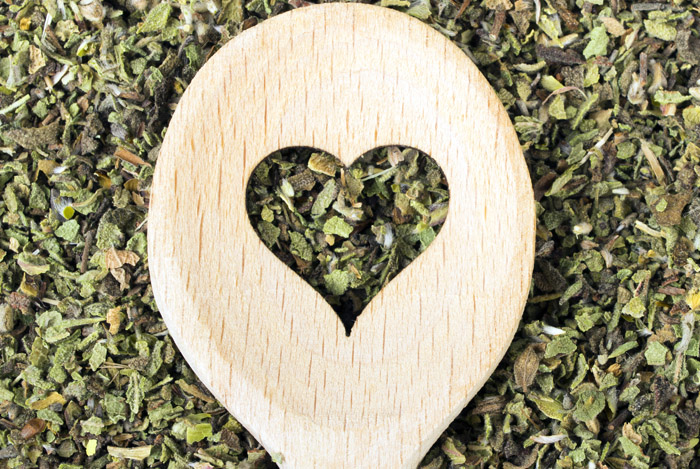
Nutrition Facts
Green tea is a natural drink derived from tea leaves.
This tea often helps people lose weight due to its low number of calories and healthy ingredients.
It is believed that green tea can actually speed up metabolism and help burn calories faster.
Because green tea only contains a few calories per cup, many list it as a zero calorie beverage.
Green tea contains antibacterial, antifungal, antioxidants, and catechins.
This tea is also rich in vitamins and minerals that stimulate health throughout the body. (1)
More than 450 organic compounds have been found in green tea.
Here are the nutritional facts per 100 ml serving of green tea.
This list refers to pure, unsweetened green tea.
- Calories 2
- Total Fat 0 g
- Calories from Fat 0
- Monounsaturated Fat 0 g
- Saturated Fat 0 g
- Cholesterol 0 mg
- Potassium 27 mg
- Trans Fat 0 g
- Magnesium 2 mg
- Polyunsaturated Fat 0 g
- Sodium 3 mg
- Vitamin C 6 mg
- Total Carbohydrate 2 g
- Dietary Fiber 0 g
- Sugars 0 g
- Protein 2 g
- Folic Acid (Folate) 16 g
- Calcium 3 mg
- Iron 2 mg
- Riboflavin (B2) 05 mg
- Manganese 31 mg
- Vitamin B6 01 mg
Health benefits of green tea are better when using fresh, loose leaf tea.
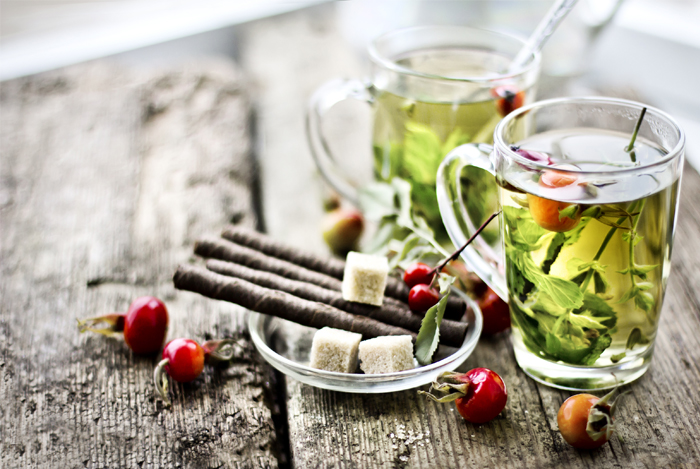
Health Benefits of Green Tea
Green tea has many uses.
Often viewed as a must-have superfood, green tea is a fantastic staple to have in your diet for its rich antioxidants.
Here are 30 health benefits of green tea.
Green Tea and Diabetes
Diabetes is a disease that affects 380 million people worldwide.
It is a metabolic disease that inhibits proper insulin production, which then raises glucose levels in the blood.
Those suffering from diabetes may have increased health risks, such as amputation, stroke, loss of vision, and heart disease (2).
Green tea may be the perfect addition to your diet if you are suffering from diabetes (3).
One Japanese study published by the Diabetes and Metabolism Journal found that participants who drank at least six cups of green tea each day were less likely to develop type 2 diabetes (4).
The polyphenols in green tea cause vasodilation or widening of the arteries to occur.
This helps reduce cholesterol and decrease blood pressure.
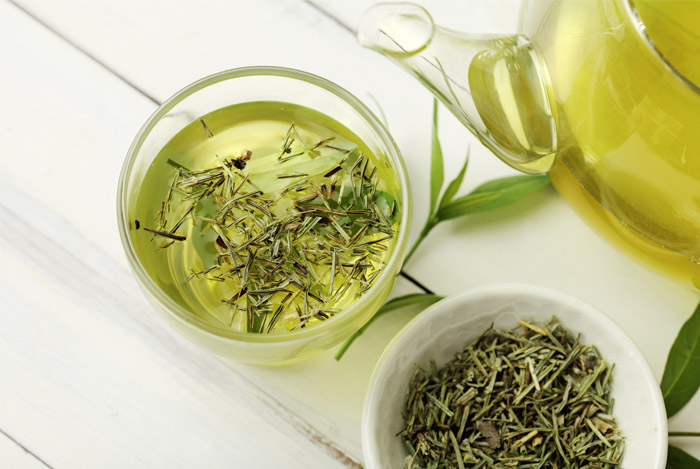
Green Tea and Gums
If you’re looking for healthy gums, look no further than green tea.
Gum disease affects many people.
Side effects include inflammation of the gums caused by bacteria.
Green tea’s anti-inflammatory properties help prevent or control periodontal disease (gum disease).
Many studies indicate that those who regularly consume green tea have healthier gums than those who do not.
Green Tea and Weight Loss
Many brands label their products as a weight loss wonder, but does green tea really live up to its claims? Yes.
In one 12-week study, participants who consumed green tea lost 0.2 to 3.5 kg more than the group that did not.
Other research found that the catechins found in green tea not only significantly decreased body weight but also actually helped participants maintain their weight.
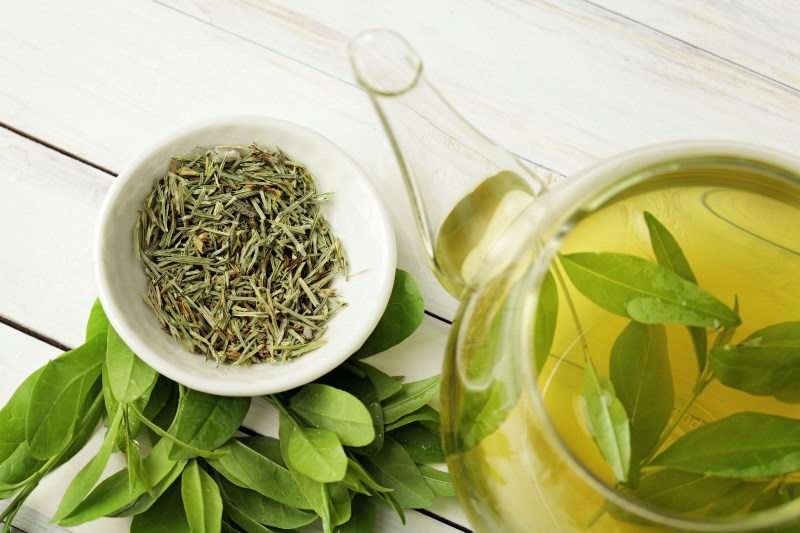
Green Tea and Eyes
Green tea is good for your eyes.
Green tea is rich in vitamin C, lutein, vitamin E, and zeaxanthin.
These antioxidants are thought to protect and strengthen your eye tissues.
The strengthening of these tissues helps protect the eyes from such diseases as glaucoma.
Green Tea and Blood Pressure
High blood pressure is a plague for many people worldwide.
Out of control blood pressure can result in heart attack and other diseases.
Green tea may be just the combatant you need to ward off high blood pressure.
Green tea contains flavonoids that promote heart health and may lower your risk of having high blood pressure by 50 percen.
Participants in another study showed significantly lowered blood pressure after three months of consuming green tea extract.
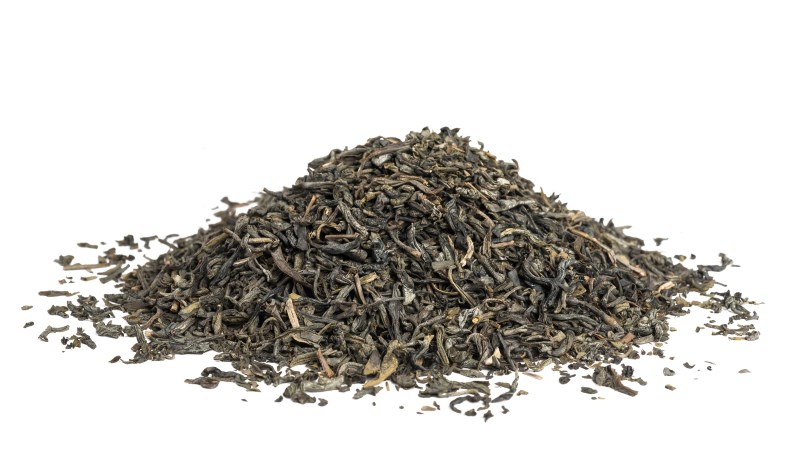
Natural Anti-Inflammatory
Want to soothe aches brought on by inflamed joints?
Have a cup of tea!
Green tea contains plenty of catechins, which make green tea a powerful antioxidant.
This antioxidant reduces interleukin-8, which is a protein that is responsible for inflammation.
Green Tea and Allergies
If you suffer from seasonal allergies, stuffy nose, sneezing, and watery eyes, green tea may be the answer you’re looking for.
Green tea may have antiallergenic properties that could help you say goodbye to allergies forever.
Japanese research suggests the antioxidants as well as the compound methylated epigallocatechin gallate found in green tea may actually block a cell receptor that triggers allergic responses .
If you suffer from allergies, have a sip of green tea.

Green Tea and Bowels
Green tea is like drinking magic in a cup, especially if you are suffering from irritable bowel syndrome (IBS).
IBS is a gut disorder that affects many people.
The digestive system is directly affected. Symptoms include constipation, diarrhea, bloating, and intense abdominal pain.
It is estimated that 20 percent of Americans suffer with IBS.
Green tea contains caffeine, which is not recommended if you are suffering from IBS, but this Japanese favorite has been shown to have a positive effect on gut microbiota.
Green tea contains anti-inflammatory properties that can calm the stomach and soothe any irritation caused by inflammation in the gut.
If you are drinking green tea for its benefits regarding IBS, choose a decaffeinated version of this green wonder drink.
Green tea should also be consumed hot when using it for gut-related health because sufferers of IBS have a weak intestinal region, and their bodies will respond better to warm fluids.
Green Tea and Depression
If you suffer from clinical depression and chronic anxiety, green tea is here to help.
Depression comes from a biochemical and hormonal imbalances as well as emotional issues.
Symptoms of depression include unexplained sadness, loss of appetite, lethargy, self-loathing, and loss of interest in routine activities.
Studies show that green tea may actually decrease symptoms of anxiety and depression.
One Japanese study of 1,058 elderly individuals found that participants who drank four or more cups of green tea per say showed fewer symptoms of depression than those who did not.
In fact, according to some researchers, the more green tea you drink, the less depressed you’ll feel.
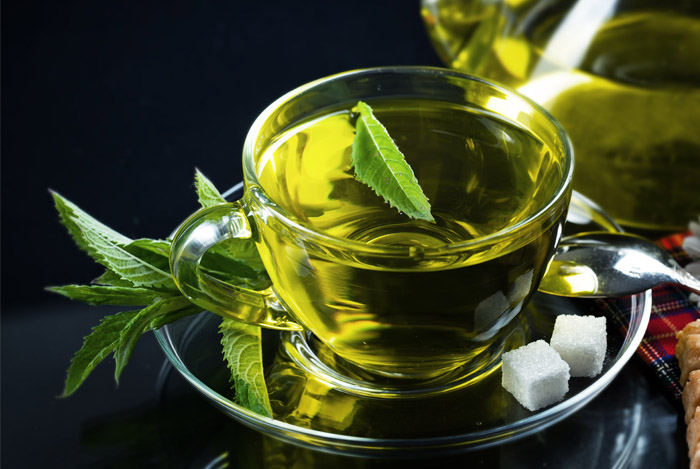
Green Tea and Heart Disease
Start protecting your heart with green tea.
Green tea may lower triglycerides and LDL cholesterol and reduce the risk of heart disease and cardiovascular diseases (17).
Heart disease affects the heart and blood vessels.
Complications of heart disease include stroke, heart attack, and even heart failure.
Green tea also improves blood flow and reduces inflammation in the heart.
Studies show that those who consume two cups or more of green tea per day will have a 39 percent lower mortality rate after a heart attack than those who do not.
In short, drinking green tea speeds up your recovery rate after a heart attack.
Theanine found in green tea has been linked to reducing your body’s physiological response to stress.
This includes slowing the heart rate and relaxing the body.
What better reason to start drinking green tea?
Green Tea and Atherosclerosis
Green tea can make your arteries healthier.
Atherosclerosis is a disease where fatty plaque builds on the walls of the arteries.
This plaque is made up of calcium, fat, and cholesterol.
Atherosclerosis can cause stroke, death, and heart attack.
The antioxidants found in green tea may help prevent atherosclerosis by lowering triglycerides and bad cholesterol.
This can help prevent the future development of coronary artery disease, peripheral arterial disease, aneurysm, and carotid artery diseases.

Natural Antibacterial Properties
Want to start washing your hands with green tea?
Now you might be able to.
Green tea has strong antibacterial properties in its leaves.
Consume two or more cups of green tea a day to help your body flush out harmful bacteria.
The more tea you drink, the better your chances of flushing the bacteria.
Green tea leaves can even be used to create antibacterial coatings to help kill germs, even on a nonstick surface.
The antibacterial properties in green tea are so strong that they may even be effective in killing E. coli bacteria.
Green Tea and Parkinson’s
The antioxidants in green tea are thought to be effective for treating Parkinson’s disease.
Studies suggest that the compounds found in green tea, when consumed regularly, could have a positive neuroprotective effect on those suffering from Parkinson’s disease.
Parkinson’s disease is a disease of the nervous system that is commonly identified by tremors and rigid muscle movement.
A study done by the Michael J. Fox Foundation for Parkinson’s Research studied four hundred patients for twelve months using both placebo and green tea polyphenol methods.
The results showed significant improvement for patients who were given the green tea.
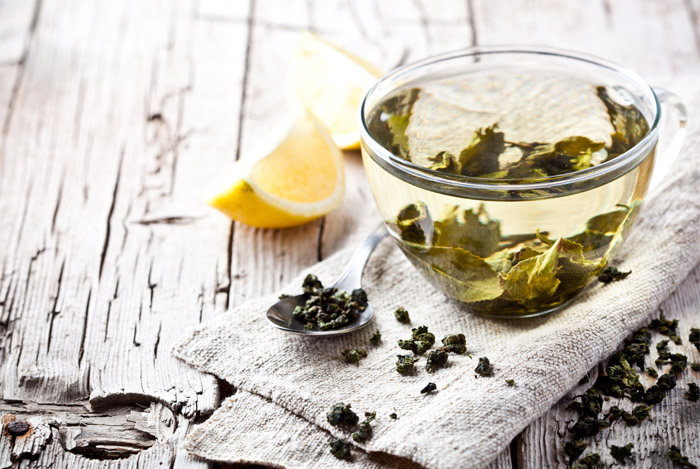
Green Tea and Headaches
If you deal with frequent headaches and can’t seem to find relief, try green tea.
Green tea may also help relieve migraine headaches.
These are severe pains in the head that are associated with such symptoms as sensitivity to light, vomiting, throbbing pain, and seeing spots.
According to Cleveland Clinic lab research, caffeine and over-the-counter drugs, such as ibuprofen, actually make pain relievers 40 percent more effective.
Caffeine allows the body to absorb medications faster, meaning quicker relief from migraine headaches.
Green tea is also a natural anti-inflammatory, which can ease the pain of headaches.
Green Tea and Bad Breath
Green tea kills microbes that cause bad breath because green tea contains antibacterial properties that flush bad breath causing bacteria from the mouth.
Green tea also contains antioxidants called polyphenols that neutralize bad breath and free radicals.
If you suffer from chronic bad breath, green tea may be an alternative health therapy you can practice right from your own home.
One study by the University of British Columbia’s Faculty of Dentistry found that green tea was more effective in freshening breath than chewing gum, mints, and parsley seed oil.
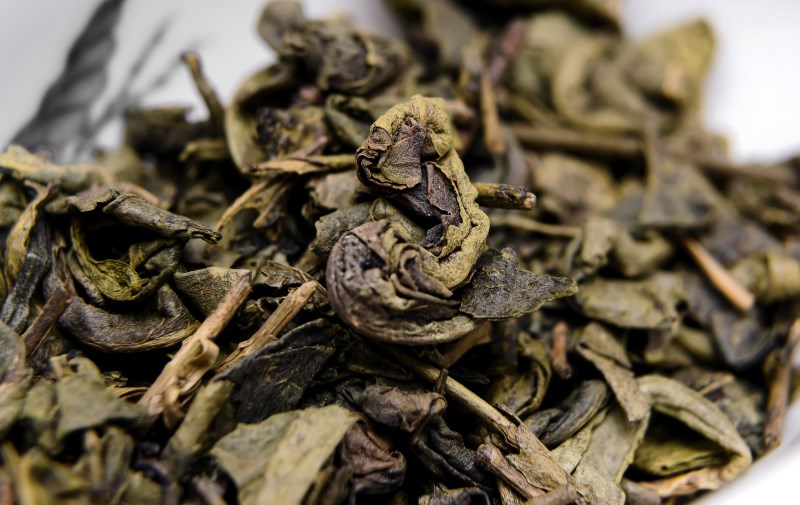
Green Tea and Alzheimer’s
While doctors do not have a known cure, green tea has been a promising lead in helping slow or prevent Alzheimer‘s and other forms of dementia.
Alzheimer’s is a disease involving a progressive deterioration of the mental faculties.
This usually occurs from midlife to old age.
This disease directly affects your memory and thinking capacity.
Studies reveal that green tea may protect the brain from beta-amyloid plaque formation.
This plaque is thought to directly cause dementia.
Green tea contains a flavonoid EGEC that can help prevent this formation and strengthen the brain against damage.
Green tea is also great for stimulating brain function and memory.
In a study on cognitive functions of the brain, patients who consumed green tea showed increased brain activity in MRI scans, improved memory, and better task performance.
Green Tea and Cholesterol
Green tea may have the power to reduce bad cholesterol.
A cup of hot green tea contains more antioxidants than a serving of vegetables, which may be directly responsible for lowering your LDL, or “bad” cholesterol .
Green tea lowers cholesterol through the antioxidant EGCG.
Research suggests drinking ten cups of green tea each day to significantly reduce your LDL cholesterol levels.
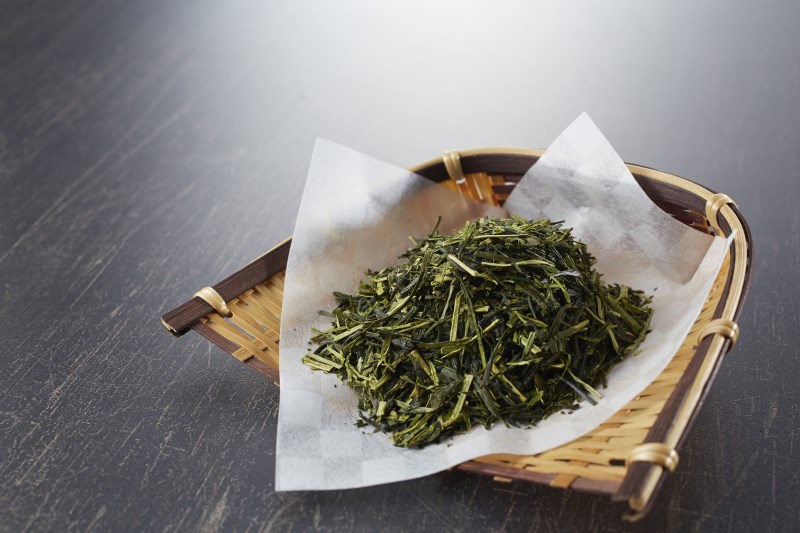
Green Tea as Sunscreen
Next time you’re headed to the beach, try adding a little green tea to your sunscreen.
Sunlight contains ultraviolet (UV) rays, which can cause damage to the skin and contribute to.
Research suggests that green tea may help protect your skin against these harmful rays.
Green tea fights against UV rays by thickening the skin, reducing inflammation, and quenching free radicals.
Green Tea and Common Cold
The next time flu season comes around try drinking more green tea for a worthwhile health boost.
Because green tea contains antioxidants, anti-inflammatories, and natural antibacterial properties, it contains all the right ingredients to help protect your body against the common cold and flu.
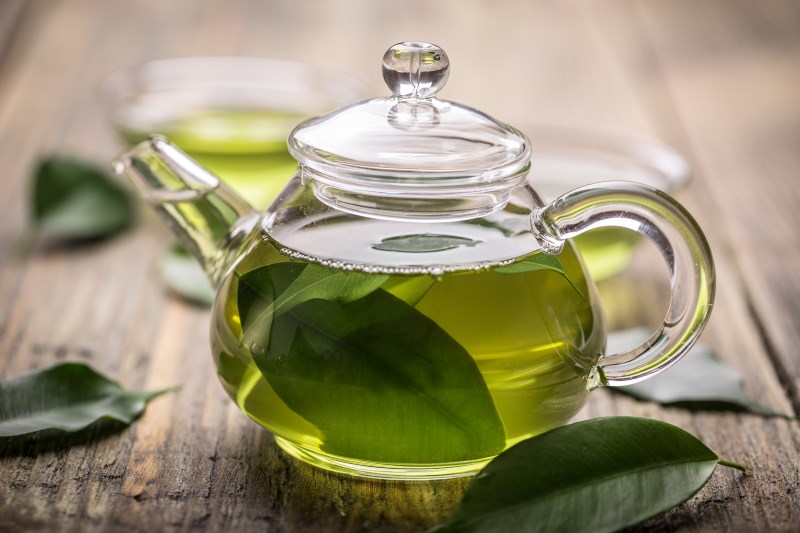
Green Tea and Chronic Fatigue Syndrome
Green tea may aid those suffering from chronic fatigue syndrome.
Chronic fatigue syndrome is a mysterious medical condition marked by extreme fatigue, aches, depression, and fever.
Green tea contains the antioxidant theanine, which is believed to boost energy, protect brain cells, increase dopamine, and boost T-cell production.
This is especially important, as those suffering from chronic fatigue usually have low T-cell counts.
Green Tea and Teeth Loss
Help prevent tooth loss by regularly sipping on green tea.
Since green tea controls the spread of bacteria in the mouth, you are more likely to have healthy teeth if you drink it regularly.
What’s more, one Japanese study revealed that people who drank green tea every day were more likely to keep their natural teeth throughout their lives.
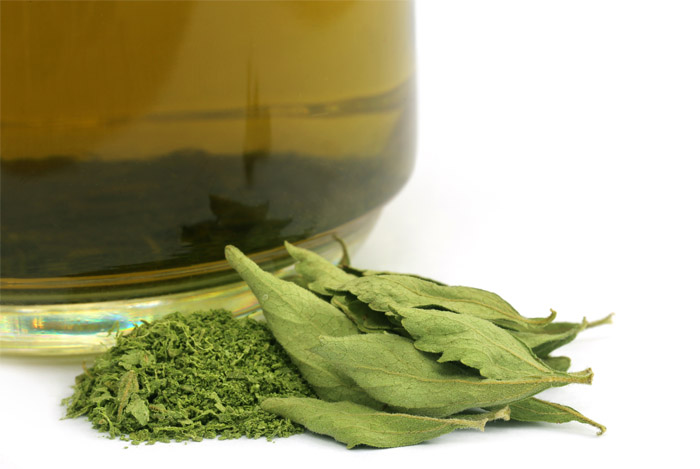
Green Tea and Genital Warts
Green tea may have healing effects on genital warts.
Genital, or venereal warts, is a sexually transmitted disease caused by a strain of the human papillomavirus.
Genital warts affect both genders and can cause discomfort, bleeding, and itching.
The catechins found in green tea are said to impart healing properties on genital warts.
So much so that the FDA has already approved prescription ointments containing green tea extract.
You may use green tea to treat genital warts by consuming it as a beverage or using it topically.
Green Tea and Cancer
The EGCG compound found in green tea may help prevent the growth of cancer cells.
Lab studies show that green tea extracts may stop cancer cells from continuing to grow by lowering cellular levels of the cyclin D1 protein, which cancer cells need to continue forming.
Not only does EGCG inhibit growth, but it also kills cancer cells.
Green tea does this by triggering proteins that cause cancer cells to die.
Green tea also helps prevent new blood cells from forming within tumors.
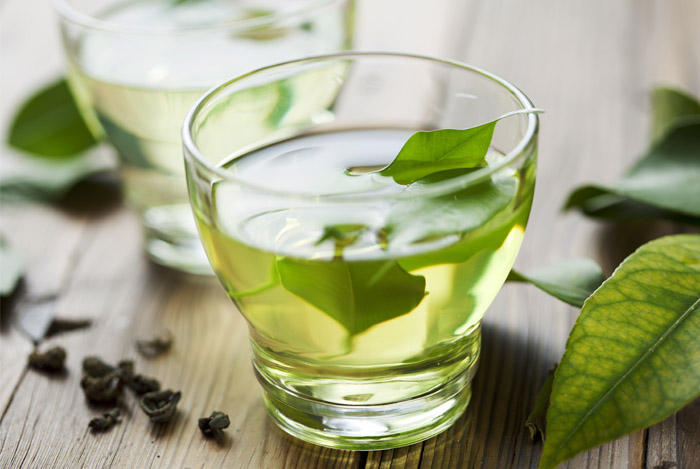
Green Tea and HPV
Green tea is the newest form of treatment for HPV and cervical cancer.
Research shows that green tea may reduce the growth of cervical cancer cells.
Green tea contains EGCG, which is a powerful antioxidant that researchers believe is the key to its anticancer effects.
You can treat HPV in many ways with green tea, such as beverage consumption, vaginal suppositories, or topical application.
Green Tea and Kidney Stones
If you have ever had kidney stones, you know how painful they can be.
A cup of green tea may be the answer to your urinary woes.
About 5 percent of the world’s population suffers from kidney stones.
This condition creates what are called calcium oxalate stones, or kidney stones.
Green tea helps beat out kidney stones by bonding to these stones and changing their shape, which makes the likelihood of the kidney stones fusing together much lower.
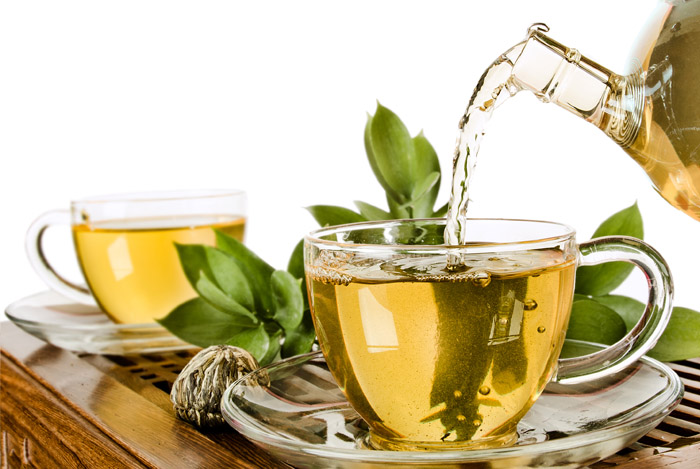
Green Tea and Cavity Prevention
As we have learned, green tea contains antimicrobial and anti-inflammatory properties that help control bacteria that may otherwise cause gum disease.
This also assists in cavity prevention.
A 2-year study backs this up showing that the molecules in green tea are useful for controlling or preventing oral infections (51).
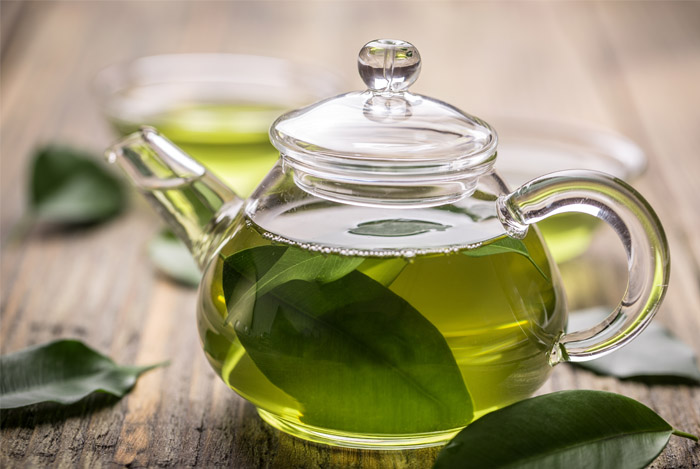
Green Tea and Skincare
Green tea is rich in skin-rejuvenating vitamins and minerals.
Everyone wants younger looking skin, and green tea may be the answer.
Green tea contains vitamin B, manganese, potassium, caffeine, amino acids, folate, and phytochemicals that are fantastic for your skin.
Green tea improves the skin’s complexion by flushing out toxins in the body and reducing inflammation.
The antioxidants found in green tea also help reduce puffiness and the appearance of dark circles.
Tone your skin and draw out impurities with green tea.
Simply brew a strong cup, allow it to cool, and pour it into a spray bottle to spritz the face and give your skin a beautiful glow.
Green tea can also help treat acne and skin conditions, such as rosacea, due to its anti-inflammatory properties and antibacterial agents (53, 54).
Green Tea and Smoking
Research suggests that consuming green tea each day may actually reduce a smoker’s urge to smoke.
Some even substitute regular cigarettes for green tea cigarettes to find relief.
Green tea may also inhibit the growth of tumors for cigarette smokers and may be beneficial to lung cancer patients.
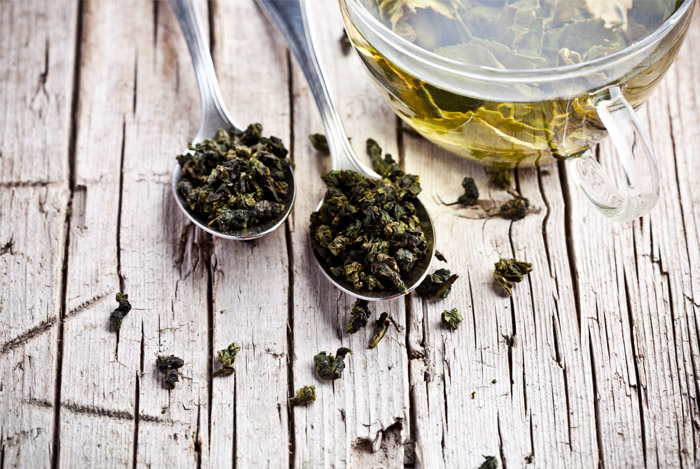
Green Tea and Down Syndrome
Green tea contains the compound Epigallocatechin-3-gallate (EGCG), an antioxidant that helps your body protect itself against cell damage.
Research suggests this compound may help fight against Down syndrome.
Down syndrome affects your cognitive functions, such as speech, memory, and language.
Spanish research used green tea to treat Down syndrome.
Results showed improved thinking abilities in patients after a yearlong study and improved nerve cell connectivity.
Other studies also suggest improvement in patients with Down syndrome in the areas of inhibitory control, visual recognition, and adaptive behavior.
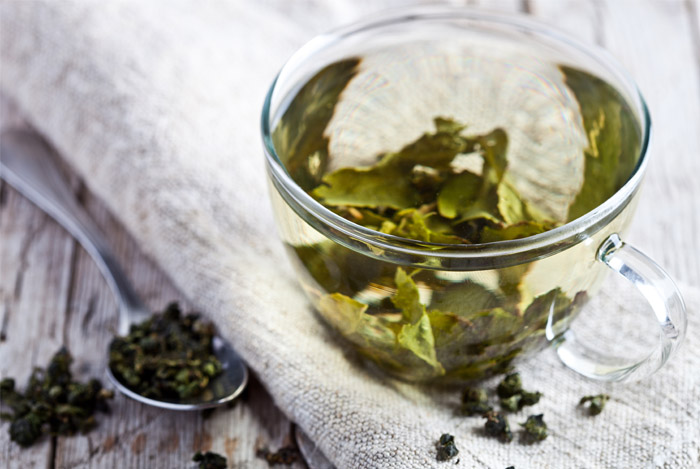
How to Buy and Store Green Tea
Many different types of green tea are available, all with amazing health benefits.
This can make your choices feel a little overwhelming, but here are some surefire tips on how to choose the best green tea.
First of all, getting the most out of your green tea has a lot to do with properly choosing your tea and the way you store your leaves.
When purchasing loose leaf or bagged tea, be aware of how the tea shop is storing their teas.
Teas that are stored in large bins will quickly lose their effectiveness due to the amount of oxygen that affects the tea.
For the best health benefits possible, choose loose leaf green teas as opposed to prebagged options.
These are not as processed as prebagged teas and offer the freshest tea possible.
The fresher the tea, the better the benefits.
Look for tea that is bright in color and smells flavorful and fresh.
Buy tea in small quantities (100 grams or less) when possible.
If you are stocking up on tea, buy several smaller bags over one large tin.
This will help keep your tea fresh for as long as possible.
Green tea grows old when it comes into contact with oxygen.
When this happens, critical vitamin C depletes, and oxygen starts to attack the antioxidants found in green tea.
Old tea leaves will begin to turn brown and lose their fresh scent.
Proper storage can help prolong the freshness and effectiveness of green tea.
Fresh green tea will have a green, refreshing scent.
The less fragrant your tea leaves become, the fewer health benefits you will receive.
Store your loose tea in an airtight container in the refrigerator.
This will help block light and air from your leaves and maintain freshness.
Use airtight Mason jars or resealable bags to store your tea.
Other forms of green tea include green tea extract, green tea powder, and green tea supplements.
These should all be stored in airtight containers and kept in dry, draft-free cupboards.

How to Include More Green Tea into Your Diet
Since green tea contains healthy antioxidants and dozens of other health benefits, you’re probably wondering how you can get more of it.
From easy recipes to out-of-the-box ideas, here are some great green tea ideas.
Iced Green Tea. Steep your tea leaves, and mix with honey and ice.
Store in the fridge overnight, and enjoy fresh iced tea in the morning.
Green Tea Sweets. Use green tea powder in the icing for cupcakes, make green tea quick bread, or use green tea in your shortbread cookies.
Brownies, French toast and pancake batter, healthy smoothies, and yogurt are all easy desserts that you can have with green tea.
Traditional Warm Green Tea. Steeping your own tea leaves is a great way to enjoy a warm cup of antioxidants in the morning.
Cooking with Green Tea. Adding green tea leaves or green tea powder to everyday meals is easy.
Use green tea to cook your rice, oatmeal, and pasta. Green tea is also great in broths and steamed meals.
Green Tea Marinades. Use green tea powder or green tea leaves in your meat marinades and sauces for an extra zing of health benefits.
Green Tea Cocktails. Use a teaspoon of green tea powder in your favorite cocktail.
You can also spike your chilled green tea for a fantastic summer cocktail loaded with health benefits.
Take it to Work. Another great way to drink more green tea is to have it ready to go first thing in the morning to take to school or work.
Brew some tea the night before for easy reheating or iced green tea on the go, or have your loose leaves ready to go in a steeping thermos.
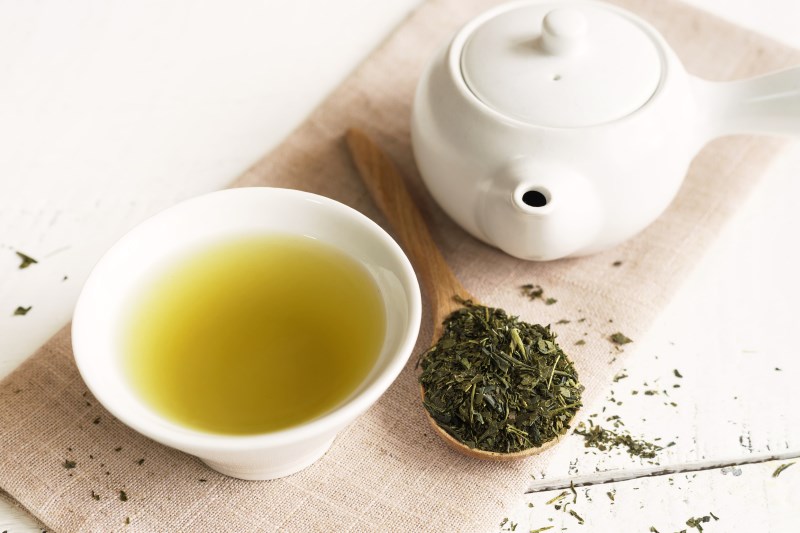
Precautions
Green tea is packed with healthy antioxidants and can do wonders for your body, but drinking too much green tea can have negative side effects in certain individuals.
If you are suffering from insomnia, you may want to steer clear of drinking green tea.
Green tea contains caffeine, which causes difficulty sleeping in most individuals.
If you are consuming high volumes of green tea, it may be dangerous to your health.
WebMD suggests that ten to fourteen grams of caffeine can be fatal.
Side effects of having too much caffeine include irregular heartbeat, dizziness, convulsions, vomiting, nervousness, headaches, diarrhea, and disarray.
Toxicity may occur even with low doses of caffeine.
Green tea may be harmful to those who suffer from anemia.
Drinking more than two cups of green tea a day may be dangerous for pregnant women.
Too much caffeine may increase the risk of miscarriage and birth defects.
Green tea may contribute to a deficiency in folic acid, which babies need to develop blood cells, the brain, and the spinal cord.
Those suffering from anxiety disorders should avoid green tea.
Green tea may increase your risk of bleeding.
If you suffer from hemophilia, green tea should be avoided.
Green tea should not be consumed if you suffer from glaucoma, as it increases the pressure inside the eyes.
Green tea should not be consumed by those suffering from osteoporosis, as it increases the amount of calcium flushed during urination.
Green tea is believed to induce liver damage and has been linked to several cases.
If you suffer from irritable bowel syndrome (IBS), all forms of caffeine should be avoided.
Caffeine may agitate symptoms of IBS.
Green tea may interact poorly with certain medicines and prescription drugs.
Speak to your doctor before consuming green tea in high doses.
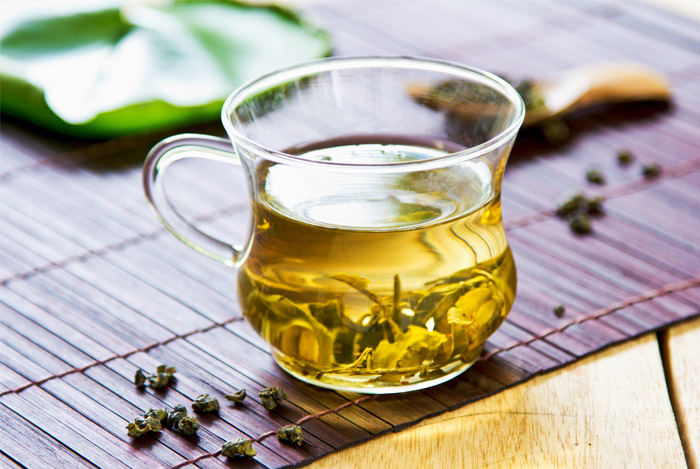
Conclusion
Green tea has become a major health trend.
Often hailed a superfood, the health benefits of green tea are nearly endless.
Look for new ways to add green tea to your diet.
Smoothies, adding tea leaves to savory sauces, capsules, and liquid ingestion are all great ways to consume green tea regularly.
Besides being delicious served hot or cold, drinking green tea has many science-proven health benefits.
If you have questions or concerns regarding regular green tea intake, contact your doctor or pharmacist.
Your body will thank you for renewed strength, increased brain activity, and stress relief that comes from drinking green tea.








































